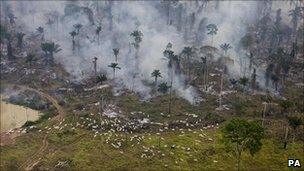Brazil: Amazon deforestation falls to new low
- Published

The figures suggest scenes like these are getting rarer in the Amazon
Deforestation in the Brazilian Amazon has fallen to its lowest rate for 22 years, the government says.
Satellite monitoring showed about 6,450 sq km of (2,490 sq miles) of rainforest were cleared between August 2009 and July 2010, a drop of 14% compared with the previous 12 months.
Brazilian officials said the reduction was due to better monitoring and police control.
Environment minister Izabella Teixeira said the figures were "fantastic".
She said she would be "proud" to present the results at the UN Climate Change Conference currently taking place in Cancun, Mexico.
She added that Brazil was well on course to reduce deforestation to its target of 5,000 sq km of by 2017.
The latest figure still represents an area more than half the size of Lebanon or Jamaica.
But it is far lower than the peak of 27,772 sq km in 2004.
President Luiz Inacio Lula da Silva said the reduction showed Brazil was "keeping its promises" on tackling global warming.
In 2005 President Lula pledged to reduce deforestation by 80% by 2020.
Global importance
Deforestation is thought to be responsible for about 20% of CO2 emissions worldwide.
The cutting and burning of trees in the Amazon has made Brazil a major contributor of the greenhouse gases that fuel global warming.
The latest data was published by the Brazilian space research institute (Inpe) which uses satellites to monitor deforestation in the Amazon.
The head of Inpe, Gilberto Camara, said the reduction was the result of "co-ordinated action", including greater control of illegal logging by Brazil's environment ministry and the federal police.
He also praised "responsible businesses" who had stopped buying beef and soya produced in deforested areas.
Mr Camara added that a programme that had given legal titles to about 300,000 landholders had also helped reduce the rate of forest clearance.
President Lula's government has also been promoting "extractive reserves" where local people can make a living from the forest without destroying it.
Environmental groups have warned that Brazil's soaring economic growth, as well as growing global demand for agricultural produce, could increase pressure on the Amazon rainforest in the coming years.
- Published12 August 2010
- Published6 June 2010